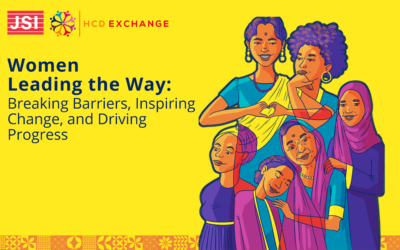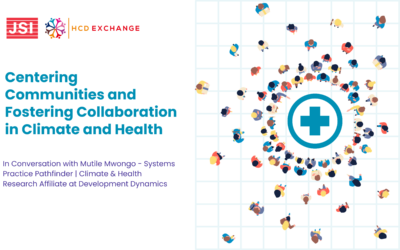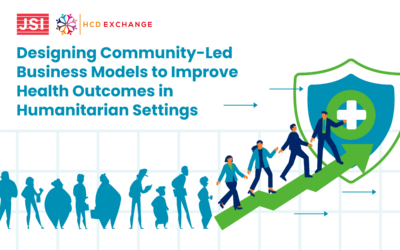
Meru Vashisht
Design Strategist, TinkerLabs
.Meru Vashisht is a human-centred designer, writer and changemaker. As a Design Strategist at TinkerLabs, she works at the intersection of gender and youth, deriving insights and design directions from qualitative research conducted in complex social challenges. She has used HCD towards the larger goal of gender equality while working across sectors including sexual health, migration, women entrepreneurship, employment generation, livelihood and domestic abuse. She also actively contributes towards taking HCD to adolescents and youth.
While working on projects aimed at meeting contraceptive needs of young women in India, I have found stories and experiences driven by fears and inhibitions. These stories and experiences often lie outside the scope of contraceptive uptake yet fall under the larger realm of sexual and emotional wellbeing. My role as a designer is often limited by the scope of the project and its intended outcomes. However, design research expands our learning beyond the target outcome, to the experience as a whole. That was how I saw an opportunity to independently discover fears and inhibitions of young women beyond the targets by developing a design-led study of post-sex fears of young women in India. I invite you to join this movement of bringing out the invisible fears, addressing them through innovation and advocating for their inclusion in further scope of work.
“Through my SRH intervention, I shed the light on the invisible, nuanced and often emotional aspects of initial sexual experiences of young women, with a focus on the post-sex journey. “
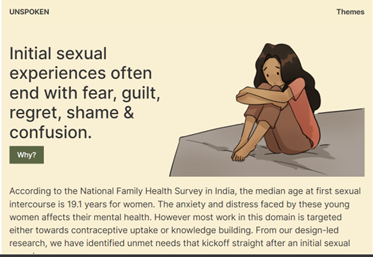
Unspoken is a digital sex education platform which addresses the post sex fears of young women
Whereas all vulnerable women have their experiences tied in doubt, there is considerable fear which is manifesting as a common pattern across their post-sex journey experiences. With this conviction, my friend Arshi and I thought of how we can use digital platform to address the fears of young women around sex.
On studying the landscape analysis of the post-sex journey of young women in India, we discovered that a lot of online SRH interventions and sex education in general, happens way early in the life of a young woman. In some parts, the sex education is part of a school or training curriculum. Thus, young women may not be necessarily as motivated to learn more. However, they may be more motivated to know more and understand better at the moment when they need the education the most, at the time of a lived sexual experience.
For instance, suppose you receiving sex education at school, the teacher may not have the professional capacity to deliver the needed sex education. This is because the teacher will be inclined to thinking that these young women should not be indulging in sex at that point in time. In turn, the young women will shy away from asking questions either because they’re not engaging in sex or because they don’t want to expose the fact that they’re engaging in sex. Fast forward to the time when the young women have their first sexual experience, that is when they are most curious and require information. This is the time when they’re in a state of panic. How might we bring in additional sex education as a tool around the sexual experience?
To address the glaring gap in sex education, Arshi and I came up with a first draft of a solution, dubbed ‘Unspoken’. Young women could become pregnant, at risk of a bad reputation, and this lived experience going outside her confidentiality circle. All of these problems that young women have exerts undue pressure of having to deal with such challenges alone. It is at this point that Unspoken steps up to to provide the post-sex education and information young women in this situation need.
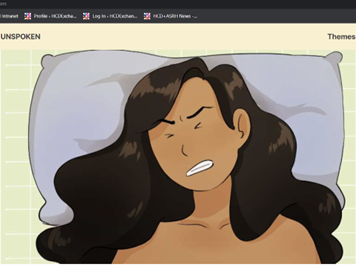
Unspoken aims to make the young women feel calm and in more control of their body and situation.
Arshi and I received a sub-grant from HCDExchange to apply human-centered design (HCD) in our primary research in order to understand the entirety of the sexual and reproductive health and rights (SRHR) domaim. This informed the design of the Unspoken platform.
“More often, after a sexual experience, the burden of responsibility passes on to the person at risk of more consequences in a sexual relationship and that is a young woman. “
This is an abridged interview conducted by Belindar Kwamboka as part of the HCDExchange Youth Leadership Hub.
Further Information
Explore the UnSpoken platform: https://www.brewingequality.in/
Linkedin: MeruVasisht
Twitter: Meru Vashisht

